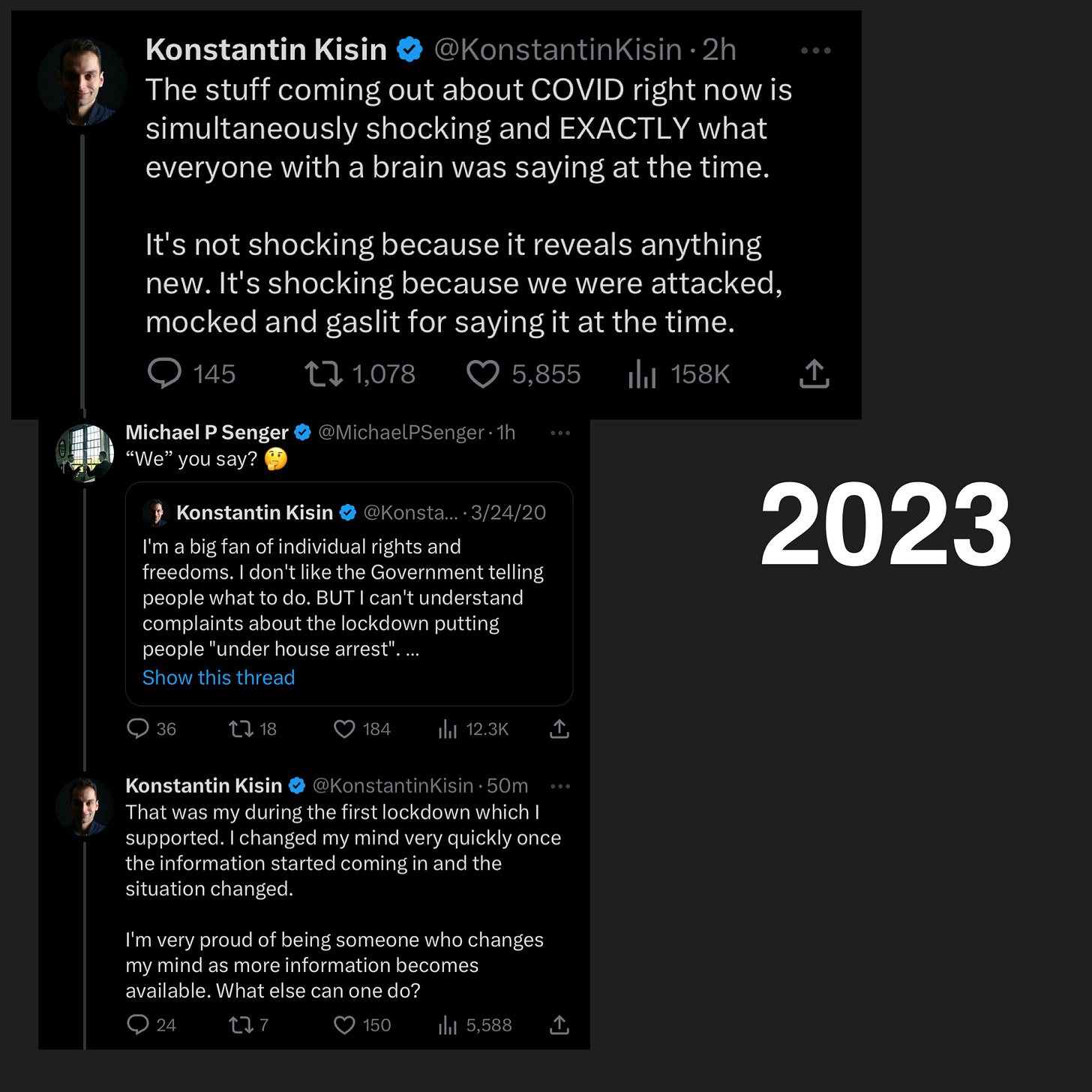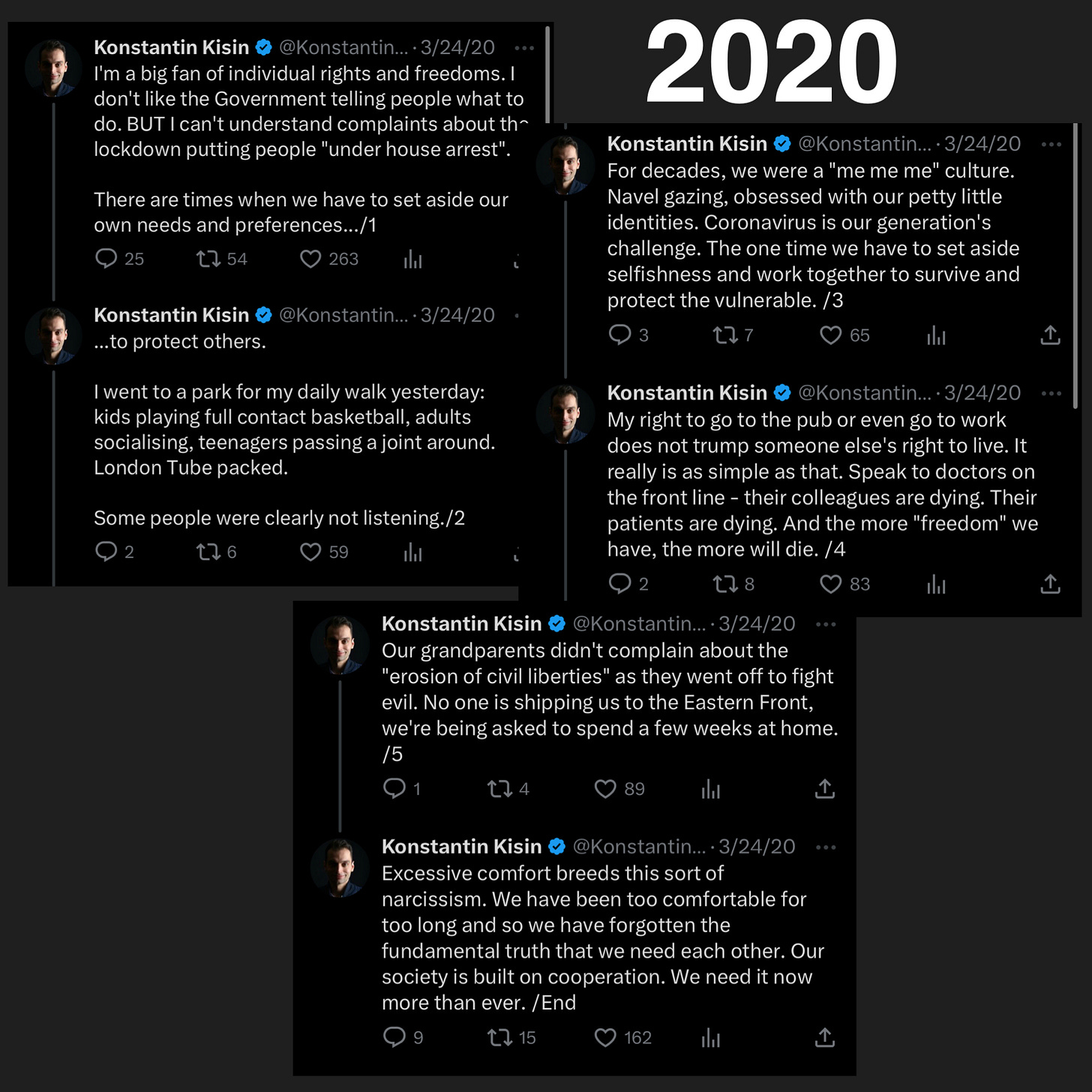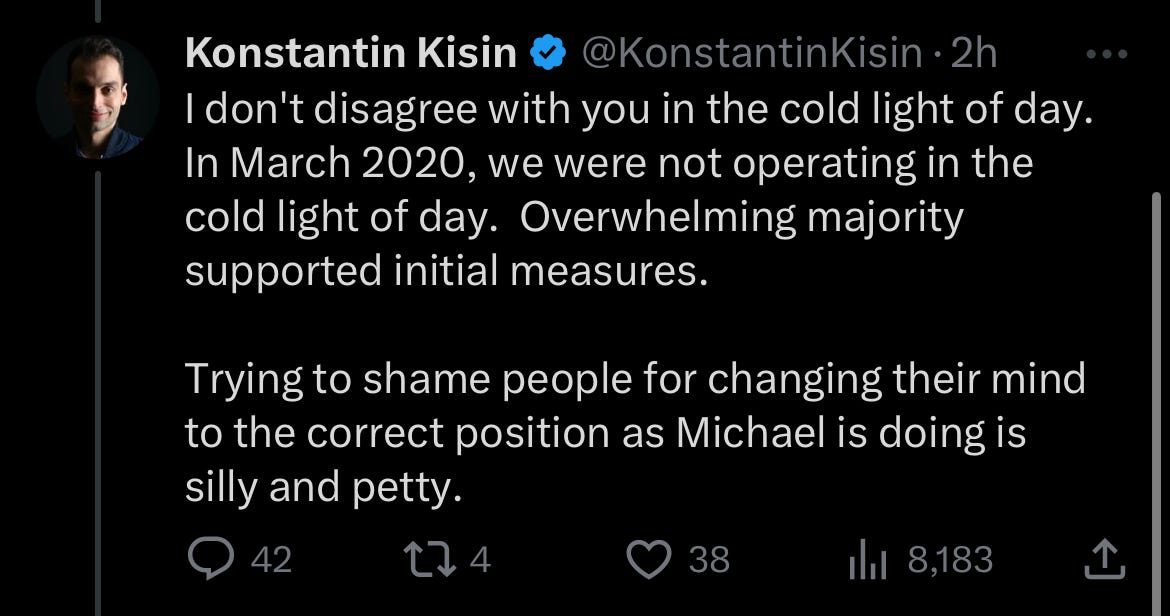Another loud voice that was for medical authoritarianism but then not
(h/t to Michael Senger.)
The people with loud voices disproportionally panicked in March of 2020, agitated for medical tyranny, GOT medical tyranny, later changed their mind, and yet seem to have no inkling of their culpability.
Changing your mind is a first step. But one must also recognize that it is voices just like yours that are why societies get thrust into great harms like democides and genocides. We got all this BECAUSE of your righteous justifications for civil liberties violations… “because emergency!”
If the above weren’t bad enough, Kisin defends himself by consensus.
That should have tipped him off. An “overwhelming majority” sounds a lot like… mass hysteria.






"UK healthcare for 21 years. The only person on planet earth to diagnose Covid 19 CORRECTLY, as Mass Psychosis, on day one. The Emperor has no clothes."
That's my bio on Twitter. Of course, i'm now completely shadow banned and effectively banned from commenting on Covid 19 on The Times, The Guardian, The Daily Mail, Youtube, The spectator and Disqus.
Only the Daily Skeptic lets me comment and even they hate me as well.
What's my crime?
I maintain that Covid 19 has never existed.
If it had, I'd have seen it because I work on a frontline Ambulance. What I saw was nothing. In fact early 2020 was the quietest time we'd experienced in the last 15 years.
If correct then not a single person on earth died of Covid 19 and many, if not all, of the excess since late 2020 were vaccine deaths.
The Covid hysterics are wrong and the Covid skeptics are wrong because neither deny the existence of the virus, only the severity of it.
This was a mind virus that spread a delusion through the medical profession and infected the scientists, politicians and the media and most of the population.
It was not a conspiracy and was not planned.
Konstantin Kisin, et. al.:
Principiis obsta and Finem respice—‘Resist the beginnings’ and ‘Consider the end.’
They Thought They Were Free: The Germans, 1933-45
Milton Mayer, 1955
https://press.uchicago.edu/Misc/Chicago/511928.html
(Excerpt from pages 166-73)
""To live in this process is absolutely not to be able to notice it—please try to believe me—unless one has a much greater degree of political awareness, acuity, than most of us had ever had occasion to develop. Each step was so small, so inconsequential, so well explained or, on occasion, ‘regretted,’ that, unless one were detached from the whole process from the beginning, unless one understood what the whole thing was in principle, what all these ‘little measures’ that no ‘patriotic German’ could resent must some day lead to, one no more saw it developing from day to day than a farmer in his field sees the corn growing. One day it is over his head.
"How is this to be avoided, among ordinary men, even highly educated ordinary men? Frankly, I do not know. I do not see, even now. Many, many times since it all happened I have pondered that pair of great maxims, Principiis obsta and Finem respice—‘Resist the beginnings’ and ‘Consider the end.’ But one must foresee the end in order to resist, or even see, the beginnings. One must foresee the end clearly and certainly and how is this to be done, by ordinary men or even by extraordinary men? Things *might* have. And everyone counts on that *might*."
...
"...In the university community, in your own community, you speak privately to your colleagues, some of whom certainly feel as you do; but what do they say? They say, ‘It’s not so bad’ or ‘You’re seeing things’ or ‘You’re an alarmist.’
"And you are an alarmist. You are saying that this must lead to this, and you can’t prove it. These are the beginnings, yes; but how do you know for sure when you don’t know the end, and how do you know, or even surmise, the end? On the one hand, your enemies, the law, the regime, the Party, intimidate you. On the other, your colleagues pooh-pooh you as pessimistic or even neurotic...."
...
"But the one great shocking occasion, when tens or hundreds or thousands will join with you, never comes. That’s the difficulty. If the last and worst act of the whole regime had come immediately after the first and smallest, thousands, yes, millions would have been sufficiently shocked—if, let us say, the gassing of the Jews in ’43 had come immediately after the ‘German Firm’ stickers on the windows of non-Jewish shops in ’33. But of course this isn’t the way it happens. In between come all the hundreds of little steps, some of them imperceptible, each of them preparing you not to be shocked by the next. Step C is not so much worse than Step B, and, if you did not make a stand at Step B, why should you at Step C? And so on to Step D.
"And one day, too late, your principles, if you were ever sensible of them, all rush in upon you. The burden of self-deception has grown too heavy, and some minor incident, in my case my little boy, hardly more than a baby, saying ‘Jewish swine,’ collapses it all at once, and you see that everything, everything, has changed and changed completely under your nose. The world you live in—your nation, your people—is not the world you were born in at all. The forms are all there, all untouched, all reassuring, the houses, the shops, the jobs, the mealtimes, the visits, the concerts, the cinema, the holidays. But the spirit, which you never noticed because you made the lifelong mistake of identifying it with the forms, is changed. Now you live in a world of hate and fear, and the people who hate and fear do not even know it themselves; when everyone is transformed, no one is transformed. Now you live in a system which rules without responsibility even to God. The system itself could not have intended this in the beginning, but in order to sustain itself it was compelled to go all the way."
...
"Suddenly it all comes down, all at once. You see what you are, what you have done, or, more accurately, what you haven’t done (for that was all that was required of most of us: that we do nothing). You remember those early meetings of your department in the university when, if one had stood, others would have stood, perhaps, but no one stood. A small matter, a matter of hiring this man or that, and you hired this one rather than that. You remember everything now, and your heart breaks. Too late. You are compromised beyond repair.
"What then? You must then shoot yourself. A few did. Or ‘adjust’ your principles. Many tried, and some, I suppose, succeeded; not I, however. Or learn to live the rest of your life with your shame. This last is the nearest there is, under the circumstances, to heroism: shame. Many Germans became this poor kind of hero, many more, I think, than the world knows or cares to know."